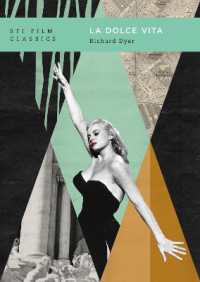- ホーム
- > 洋書
- > 英文書
- > Literary Criticism
Full Description
WINNER, HELEN AND HOWARD R. MARRARO PRIZE IN ITALIAN HISTORY
Discloses the richness of ideas and sheds light on the controversy that characterized the transition from fascism to democracy, examining authors, works and memories that were subsequently silenced by Cold War politics.
How a shared memory of Fascism and its cultural heritage took shape is still today the most disputed question of modern Italy, crossing the boundaries between academic and public discourse. Against Redemption concentrates on the historical period in which disagreement was at its highest: the transition between the downfall of Mussolini in July 1943 and the victory of the Christian Democrats over the Left in the 1948 general elections. By dispelling the silence around the range of opinion in the years before the ideological struggle fossilized into Cold War oppositions, this book points to early postwar literary practices as the main vehicle for intellectual dissent, shedding new light on the role of cultural policies in institutionalizing collective memory.
During Italy's transition to democracy, competing narratives over the recent traumatic past emerged and crystallized, depicting the country's break with Mussolini's regime as a political and personal redemption from its politics of exclusion and unrestrained use of violence. Conversely, outstanding authors such as Elsa Morante, Carlo Levi, Alberto Moravia, and Curzio Malaparte, in close dialogue with remarkable but now-neglected figures, stressed the cultural continuity between the new democracy and Fascism, igniting heated debates from opposite political standpoints. Their works addressed questions such as the working through of national defeat, Italian responsibility in World War II, and the Holocaust, revealing how the social, racial, and gender biases that characterized Fascism survived after its demise and haunted the newborn democracy.
Contents
Introduction: Ruins and Debris of a Contested History 1
1. After Italian Totalitarianism 27
2. The Language of Responsibility 65
3. Ghosts from a Recent Past 96
4. Carlo Levi on the Religion of the State 140
5. Curzio Malaparte, a Tragic Modernity 172
Conclusion: Tearing Down the Monuments 199
Acknowledgments 205
Notes 209
Bibliography 265
Index 295








